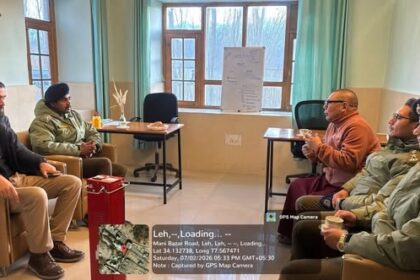Srinagar-Udhampur Rail Project Faces 6-Month Delay Amid Tunnel Challenges.
May 07, 2024
||Black and White Digital News||
In a region where promises have been abundant but progress remains elusive, the Jammu-Poonch rail link stands as a symbol of unmet expectations and unrealized aspirations. Despite repeated assurances from various political parties over the years, the vision of connecting Jammu with Poonch through a railway network remains mired in delays and bureaucratic hurdles.
The concept of the Jammu-Poonch rail link has been a recurring theme in political campaigns, with leaders across party lines pledging to prioritize its construction and deliver tangible results for the people of Jammu and Poonch. However, the reality on the ground paints a starkly different picture, characterized by a lack of substantive progress and continued disappointment among local residents.
Over the years, promises have been made during election rallies and public addresses, emphasizing the transformative impact of a railway connection between Jammu and Poonch. The potential benefits of enhanced connectivity, economic growth, and improved accessibility to remote areas have been championed as key selling points by politicians seeking public support.
However, despite these assurances, the Jammu-Poonch rail link remains in the realm of promises rather than tangible progress. The absence of meaningful steps towards its realization has led to widespread disillusionment and frustration among the populace, who have long awaited the socio-economic benefits that such a project could bring.
Local communities in Poonch, particularly, have expressed deep-seated disappointment over the failure of successive governments to translate rhetoric into action. The persistent delays and lack of concrete timelines for the rail link have fueled skepticism and eroded trust in political leadership.
While the promise of the Jammu-Poonch rail link continues to be invoked during election cycles, residents of these regions continue to grapple with inadequate infrastructure and limited access to essential services. The failure to deliver on this critical transportation project underscores broader concerns about governance and accountability in the region.
As political parties gear up for upcoming elections, the fate of the Jammu-Poonch rail link remains uncertain, with voters demanding substantive action rather than empty promises. The need for tangible progress on infrastructure development, including the long-awaited rail link, has become a rallying cry for local communities seeking genuine change and meaningful representation.
In the absence of concrete steps towards the realization of the Jammu-Poonch rail link, the gap between political rhetoric and ground-level realities continues to widen, underscoring the challenges of governance and development in the region. The journey towards fulfilling this longstanding promise remains fraught with obstacles, highlighting the enduring struggle for progress and accountability in Jammu and Poonch.
*Kashmir Rail Link Progress: Northern Railway Overcomes Hurdles in Tunnel Construction”*
In a remarkable endeavor to connect Kashmir with the rest of the country via railway, the Northern Railway is diligently working to overcome challenges, particularly focusing on Tunnel 1 near Katra, which has proven to be a significant obstacle in the completion of the ambitious Jammu to Baramulla rail link project.
The 3.2-km-long Tunnel 1, essential for the rail link’s connectivity, is estimated to require an additional six to seven months for completion, according to sources within the Northern Railway. This delay is attributed to complex technical and geological issues encountered during the tunnel’s construction and the laying of associated railway tracks.
Sources close to the project highlighted the perseverance required by the construction agency, Konkan Railways, as they faced daunting challenges during the tunnel’s boring phase. “There were moments when engineers contemplated halting the tunnel work altogether,” a source revealed, emphasizing the rigorous efforts to overcome these obstacles with advanced technology.
“Currently, the heading and benching work is underway despite encountering difficulties such as cavities and geological complexities,” the source continued, underscoring the determination to expedite progress. The completion of these phases will pave the way for track laying, anticipated to follow in the coming months, barring unforeseen complications.
The Jammu to Baramulla rail link, spanning 338 kilometers, promises to revolutionize connectivity to Kashmir by integrating it with the national railway network. Once operational, this project will offer an alternative to road and air transportation, enabling easier access to the picturesque valley by train.
Despite recording substantial delays, including a maximum delay of 255 months in the Udhampur-Srinagar-Baramulla (USBRL) project, authorities stress the unique challenges posed by the region’s terrain, notably the young Himalayas. The construction has encountered surprises due to geological complexities, requiring meticulous planning and adaptation to ensure safe and efficient completion.
The USBRL project comprises numerous tunnels, with the longest, Tunnel T49 measuring 12.77 km, set to become the longest railway tunnel in India. Geological experts cautioned about challenges posed by continuous mountain growth, water presence, and loose strata, factors contributing to construction delays and requiring constant vigilance by the construction agency.
In a positive development, the train service between Sangaldan and Reasi is nearing readiness, pending resolution of minor technical issues. Once operational, this route will traverse the world’s highest single arch railway bridge over the Chenab River, a significant engineering feat achieved by Konkan Railways.
Railway Minister Ashwini Vaishnaw informed the Lok Sabha of substantial progress in the project, with over 161 km already commissioned out of the total 272 km. The Katra-Banihal section, covering 111 km, remains a focal point for ongoing efforts, reflecting the magnitude and complexity of the task at hand.
The USBRL project epitomizes one of India’s most challenging railway initiatives post-independence, navigating through formidable geographical obstacles. The perseverance and dedication exhibited by the construction agencies underscore the monumental effort required to realize this transformative infrastructure project, promising unprecedented connectivity for the people of Kashmir and the nation at large.
Leave a comment
You Might Also Like
SSP Leh Along with District Officials Visit De-Addiction Centre Leh, Encourage Patients Towards Recovery and Rehabilitation
SSP Leh Along with District Officials Visit De-Addiction Centre Leh, Encourage Patients Towards Recovery and Rehabilitation Leh, Feb 9: Today,…
1 Min Read
Katra Roop Way Bun Kar Rehega MLA Katra Baldev Raj Sharma Ka Bayan Me Jeeta He Isi Promise Pe Hu
Katra Roop Way Bun Kar Rehega MLA Katra Baldev Raj Sharma Ka Bayan Me Jeeta He Isi Promise Pe Hu…
0 Min Read
PDP Na BJP K Sath Alliance Na Kiya Hota Aaj Article 370 Bhi Hota Aur J&K Ki Halat Bhi Behtar Hoti Nc Senior Leader Mubarak Gul
PDP Na BJP K Sath Alliance Na Kiya Hota Aaj Article 370 Bhi Hota Aur J&K Ki Halat Bhi Behtar…
0 Min Read
Implementation of Rural Development Schemes Concludes at Leh
Implementation of Rural Development Schemes Concludes at Leh Leh, February 07, 2026: The three-day State-Level Training Programme on Effective Implementation…
2 Min Read








